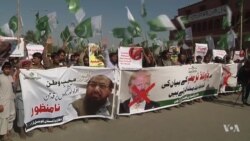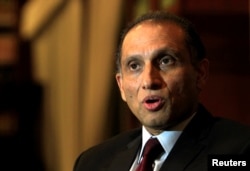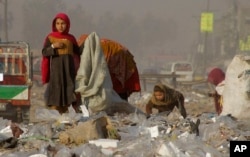The United States is suspending security assistance to Pakistan's army until it takes "decisive action" against the Afghan Taliban and the Haqqani network.
"We consider them to be destabilizing the region and also targeting U.S. personnel," State Department spokeswoman Heather Nauert said Thursday in announcing the suspension.
She gave no details about what aid would be affected or how much.
WATCH: US Suspends Security Aid to Pakistan
Speculation about what the U.S. may do has created a lot of uncertainty and anxiety in Pakistan following President Donald Trump's New Year's Day tweet, in which he threatened to slash funding for Pakistan, accusing it of giving safe haven to terrorists and playing U.S. leaders for "fools."
Denounces comments
Islamabad denounced the comments as "completely incomprehensible" and reiterated its vow to work with Washington to fight terrorism and stabilize Afghanistan. Pakistani leaders insist the United States is scapegoating their country for its Afghan "failures."
Trump's Twitter outburst set off a war of words, fueling concerns about a breakdown in historically fragile relations between the United States and Pakistan.
Pakistan's ambassador to Washington, Aizaz Ahmad Chaudhry, told VOA the two countries should try to remain engaged and avoid steps that could create tension and destabilize the region.
"We should not be on the collision course," he said. "That's the point we want to make because, I think, if we move in that direction, both countries will drift apart, and I do not think that it is in the interest of either state to drift apart. I think we have got to find ways, more creative ways to build each other's trust to work together. That's the direction that we think that we should be going to."
He said national security forces had cleared Pakistani soil of all terrorist groups and pointed to what he called Islamabad's "unmatched" contribution to U.S.-led international efforts to stabilize Afghanistan and promote a peaceful settlement of the conflict there.
"Pakistan has also facilitated the U.S. and worked together with it to decimate al-Qaida," Chaudhry said. "If you do not hear about al-Qaida today, it is because we worked together to a successful end. Pakistan has been providing lines of communications to the U.S. for a long time. It is a partnership to us, and it should be measured not in terms of money and monetary value but in terms of the results that we have achieved together."
Focus on other issues
He urged the Trump administration to focus on the issues of governance, corruption, deteriorating security and Islamic State in Afghanistan. Chaudhry said ungoverned spaces in Afghanistan were threatening security in Pakistan and the region in general.
"So, all these are matters of concern for us because we are suffering because of this, and that's why we have been saying many times that ... you need to address those issues and not place the blame on Pakistan's doorsteps for all the failure in Afghanistan," he said.
There is wide speculation that Pakistani security officials allegedly tied to terrorist groups could face U.S. sanctions and that the U.S. military may undertake unilateral strikes deep inside Pakistan to target terrorists linked to the Taliban-allied Haqqani network (HQN). The network is allegedly tied to the ISI, the Pakistani spy agency.
"In case of U.S. action against Pakistan, it will be responding to the aspiration of people of Pakistan," army spokesman Major General Asif Ghafoor said with regard to the possible strikes against terrorists. "We have taken action against HQN. Effects of the action against HQN will be visible in due time."
The army spokesman also complained that the presence of about 2.7 million Afghan refugees in Pakistan hampers counterterrorism efforts; insurgents often hide out among the displaced population, he said. Pakistani officials have been pressing the United States and its allies to arrange for the refugees to go back to Afghanistan as soon as possible.
Afghan refugees
The Pakistani government on Wednesday granted only a one-month extension of the legal residency status of 1.4 million documented Afghan refugees. A one-year extension had been considered, but Pakistan said it could no longer sustain the economic burden of hosting the refugees.
A national security committee of the parliament also held an urgent meeting Thursday, where the foreign and defense ministers briefed leaders of major political parties on what will come next following Trump's tweet.
Pakistani civilian and military leaders have said Trump's claim that the U.S. has given more than $33 billion to Islamabad since 2002 to help fight terrorism is wrong.
Officials say that almost $14 billion of the amount in question was part of the Coalition Support Fund (CSF), which was reimbursement for the money Pakistan spent on security operations in support of coalition efforts in Afghanistan. The Pakistan government said the total amount billed under CSF has been about $22 billion and Washington still owes Islamabad $8 billion.
Pakistan also maintains it has lost around 70,000 lives, mostly civilians, in terrorist attacks since joining the U.S. counterterrorism coalition, and that the national economy has also suffered losses of more than $120 billion.








